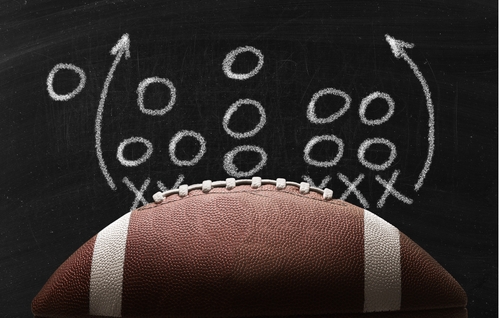In praying football coach case, 4 SCOTUS justices criticize 9th Circuit’s ‘highly tendentious’ reading of precedent

Photo by Billion Photos/Shutterstock.com.
Four Supreme Court justices on Tuesday expressed concern about an appellate court’s views on teachers’ religious rights in the case of a praying football coach.
The justices said in a statement they agreed with the decision to deny certiorari because of unresolved factual questions in the case of Joseph A. Kennedy. But they expressed concern about the views of the 9th U.S. Circuit Court of Appeals at San Francisco.
Justice Samuel A. Alito Jr. wrote the statement, which was joined by Justices Clarence Thomas, Neil M. Gorsuch and Brett M. Kavanaugh. (The statement begins at page 8 of the PDF.)
Kennedy said he was wrongly fired as a football coach at a public high school for kneeling on the football field and praying after games. Kennedy had claimed the decision by the Bremerton School District in Washington state violated his free speech rights.
Alito said it was unclear whether Kennedy was fired for neglecting to supervise the football players during his prayers or for praying when he wasn’t really on duty or when he would have been allowed a short break for private conduct.
Despite his agreement that the court should not hear Kennedy’s case, Alito said he found the views of the 9th Circuit “most troubling.”
Alito said the 9th Circuit had applied the Supreme Court’s 2006 decision on public employee speech in Garcetti v. Ceballos to “public school teachers and coaches in a highly tendentious way.”
“The 9th Circuit appears to regard teachers and coaches as being on duty at all times from the moment they report for work to the moment they depart, provided that they are within the eyesight of students,” Alito wrote.
“Under this interpretation of Garcetti, if teachers are visible to a student while eating lunch, they can be ordered not to engage in any ‘demonstrative’ conduct of a religious nature, such as folding their hands or bowing their heads in prayer. And a school could also regulate what teachers do during a period when they are not teaching by preventing them from reading things that might be spotted by students or saying things that might be overheard. This court certainly has never read Garcetti to go that far.”
The 9th Circuit decision in Kennedy’s case also had criticized him for media appearances and praying in the bleachers after his suspension while wearing school apparel. The 9th Circuit’s language “can be understood to mean that a coach’s duty to serve as a good role model requires the coach to refrain from any manifestation of religious faith—even when the coach is plainly not on duty,” Alito said.
“The suggestion that even while off duty, a teacher or coach cannot engage in any outward manifestation of religious faith is remarkable,” he wrote.
Hat tip to SCOTUSblog.
Write a letter to the editor, share a story tip or update, or report an error.


